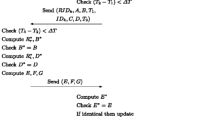Abstract
Radio-frequency Identification (RFID) schemes have been widely adopted in medical healthcare environments such as telecare medicine information system (TMIS). There are many research focus in the privacy protection of medical information security with cloud computing and big data technologies. This paper deeply identified the attacks of two RFID protocols in the literature. Fan et al.’s protocol (LRMP) and Benssalah et al.’s scheme (TMISP) both are subjected to tracking attacks, tag impersonation attacks, reader impersonation attacks. LRMP protocol suffers from de-synchronization attacks. In order to solve main weaknesses, the article presents a RFID medical privacy protection scheme based on cloud computing. The scheme ensures security and privacy of the collected data via secure authentication. The security analysis and performance evaluation shows that the proposed scheme can effectively solve security and privacy weaknesses, and resist against forward traceable attacks and backward traceable attacks.






Similar content being viewed by others
References
Pérez, M. M., Dafonte, C., & Ángel, Gómez. (2018). Traceability in patient healthcare through the integration of RFID technology in an ICU in a hospital. Sensors, 18(5), 1627.
Kuhn, M. F., Breier, G. P., Dias, A. R. P., et al. (2018). A novel RFID-based strain sensor for wireless structural health monitoring. Journal of Nondestructive Evaluation, 37(2), 22.
Yoo, S., Hwang, H., & Jheon, S. (2016). Hospital information systems: experience at the fully digitized Seoul National University Bundang Hospital. Journal of Thoracic Disease, 8(Suppl 8), S637.
Benssalah, M., Djeddou, M., & Drouiche, K. (2017). A provably secure RFID authentication protocol based on elliptic curve signature with message recovery suitable for m-Health environments. Transactions on Emerging Telecommunications Technologies, 28(11), e3166.
Rodrigues, J. J. P. C., Silva, B. M. C., Saleem, K., et al. (2016). An IoT-based mobile gateway for intelligent personal assistants on mobile health environments. Journal of Network & Computer Applications, 71(C), 194–204.
Kumar, N., Kaur, K., Misra, S. C., et al. (2016). An intelligent RFID-enabled authentication scheme for healthcare applications in vehicular mobile cloud. Peer-to-Peer Networking and Applications, 9(5), 824–840.
Benssalah, M., Djeddou, M., & Drouiche, K. (2017). Security analysis and enhancement of the most recent RFID authentication protocol for telecare medicine information system. Wireless Personal Communications, 96(4), 6221–6238.
Li, C.-T., Weng, C.-Y., & Lee, C.-C. (2015). A secure RFID tag authentication protocol with privacy preserving in telecare medicine information system. Journal of Medical Systems, 39(8), 1–8.
Srivastava, K., Awasthi, A. K., Kaul, S. D., & Mittal, R. C. (2015). A hash based mutual RFID tag authentication protocol in telecare medicine information system. Journal of Medical Systems, 39(1), 1–5.
Kardaş, S., Çelik, S., Arslan, A., et al. (2013). An efficient and private RFID authentication protocol supporting ownership transfer. Lightweight cryptography for security and privacy (pp. 130–141). Berlin: Springer.
Ellouze, N., Rekhis, S., Boudriga, N., et al. (2018). Powerless security for cardiac implantable medical devices: Use of wireless identification and sensing platform. Journal of Network & Computer Applications, 107, 1–21.
Adame, T., Bel, A., Carreras, A., et al. (2016). CUIDATS: An RFID–WSN hybrid monitoring system for smart health care environments. Future Generation Computer Systems, 78, 602–615.
Xiao, F., Miao, Q., Xie, X., et al. (2018). SHMO: A seniors health monitoring system based on energy-free sensing. Computer Networks, 132, 108–117.
Liang, W., Tao, G., Xian, P. T., et al. (2016). Toward a wearable RFID system for real-time activity recognition using radio patterns. IEEE Transactions on Mobile Computing, 16(1), 228–242.
Marouf, F. Z., & Kerarti, D. Z. (2018). Study and design of wristband RFID antenna for healthcare applications. Microwave & Optical Technology Letters, 60(2), 359–364.
Rahman, F., Bhuiyan, M. Z. A., & Ahamed, S. I. (2016). A privacy preserving framework for RFID based healthcare systems. Future Generation Computer Systems, 72, 339–352.
Fan, K., Jiang, W., Li, H., et al. (2018). Lightweight RFID protocol for medical privacy protection in IoT. IEEE Transactions on Industrial Informatics, 14, 1656–1665.
Acknowledgements
This work is supported in part by Jiangsu Postdoctoral Science Foundation (Grant Nos. 1701061B, 2017107007); Xuzhou Medical University Affiliated Hospital Postdoctoral Science Foundation (Grant No. 2016107011); Xuzhou Medical University Excellent Persons Scientific Research Foundation (Grant Nos. D2016006, D2016007, 53591506); The Practice Inovation Trainng Program Projects for the Jiangsu College Students (Grant Nos. 20161031308H, 201610313043Y); The Natural Science Foundation of the Jiangsu Higher Education Institutions of China (Grant No. 16KJB180028); Educational Commission of Jiangsu Province of China (Grant No. 2015JSJJG261); 333 Project of Jiangsu Province (No. BRA2017278).
Author information
Authors and Affiliations
Corresponding author
Ethics declarations
Conflict of interest
The authors declare no conflict of interest.
Additional information
Publisher's Note
Springer Nature remains neutral with regard to jurisdictional claims in published maps and institutional affiliations.
Rights and permissions
About this article
Cite this article
Chen, X., Geng, D., Zhai, J. et al. Security Analysis and Enhancement of the Most Recent RFID Protocol for Telecare Medicine Information System. Wireless Pers Commun 114, 1371–1387 (2020). https://doi.org/10.1007/s11277-020-07424-w
Published:
Issue Date:
DOI: https://doi.org/10.1007/s11277-020-07424-w




